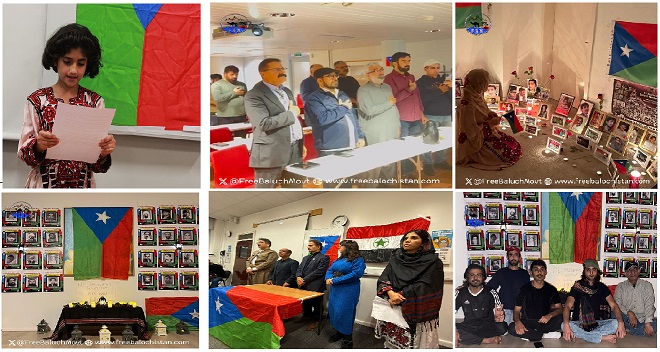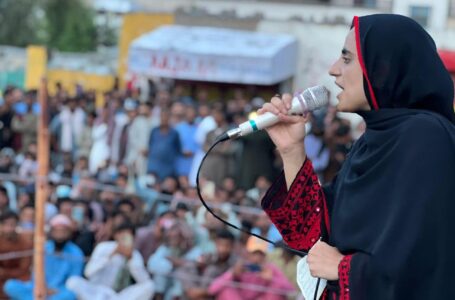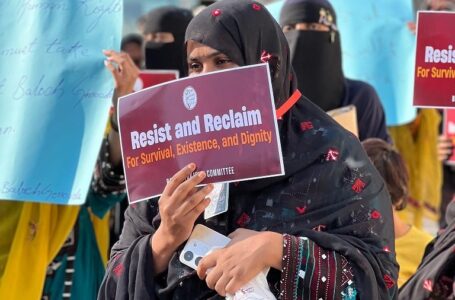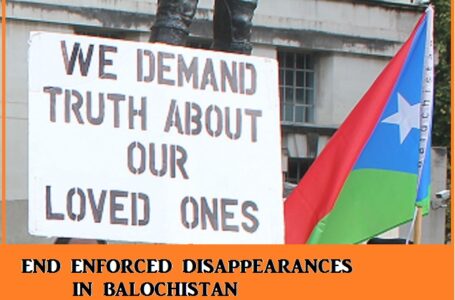The Case for a Free Balochistan: A Catalyst for Regional Stability and Prosperity
Free Balochistan Movement Commemorates Baloch Martyrs’ Day Across European Countries

LONDON (November 13, 2024): The Free Balochistan Movement (FBM) marked Baloch Martyrs’ Day on November 13, 2024, with commemorations across the United Kingdom, Germany, the Netherlands, and Finland.
These events honoured the sacrifices of Baloch martyrs who gave their lives in the struggle for Balochistan’s independence while highlighting the ongoing oppression faced by the Baloch people under Iranian and Pakistani occupation.
The day also called for greater unity among oppressed nations, with activists from various communities rallying to support the Baloch cause.
London Seminar: A Call for Collective Resistance
In London, the FBM UK Branch hosted a seminar attended by members of the Baloch community, along with representatives from Kurdish, Arab, and other international groups. The event featured prominent speakers who emphasised the importance of solidarity and collective action, particularly among nations oppressed by Iran and Pakistan.
Special guests included Jamal Poorkarim, leader of the Kurdistan Independence Movement from Iranian-occupied Kurdistan, and Goran Dashti, a member of its Executive Committee.
Mehrab Sarju, a representative of Balochistan Raaji Zrombesh (Balochistan National Movement), paid tribute to the Baloch martyrs, stating that while they valued life and sought peace, they chose to sacrifice for the collective good of their nation.
“We honour their service and bravery,” he said, calling for renewed efforts in the ongoing struggle for freedom.
Mr Poorkarim also paid tribute to the Baloch martyrs, stressing the need for united resistance among the Kurds, Baloch, Ahwazi Arabs, and other oppressed nations under Iranian occupation. “It is time for all of us to unite and resist the shared forces of oppression,” he declared.
Goran Dashti discussed the history of Baloch resistance, from early battles led by Mir Mehrab against British forces to the ongoing struggles in Balochistan. He underscored the shared fight for freedom between the Baloch and Kurds, calling for unity to challenge the regional powers that subjugate them.
Sonia Karimi, representing the Kurdish community, highlighted the critical role of women in national liberation movements, praising Baloch women as “shooting stars” in the face of oppression.
Droshum Marri, the youngest speaker, shared her personal experience of losing two uncles to the cause of Balochistan’s liberation.
She said, “It is a day to remember our martyrs who laid down their lives for the dignity and the legitimate cause of our struggle against Iranian and Pakistani occupation. Two of my uncles, Faiz Mohammad Marri and Hodad Marri, were abducted by Pakistani forces and later killed. They were taken from us before I was even born. I never got to see their smiles or hear their voices, but I know they loved Balochistan.
“I feel proud of them, but I also feel sad because I wish they were here. This is not only my story; it is the story of thousands of Baloch sons and daughters whose loved ones were taken away by Iranian and Pakistani forces and were never seen again.”
Abdul Rahman Haidari, from the Patriotic Arab Democratic Movement (PADM) of Al-Ahwaz, linked the struggles of the Baloch and Ahwazi Arab peoples, emphasizing their shared history of resistance. “Our struggles are intertwined,” he said, “and today we honour our martyrs in the fight for justice and self-determination.”
Shahswari Karimzadi, Vice President of the FBM, praised the sacrifices of the Baloch martyrs and called for greater unity among oppressed nations under Iranian and Pakistani occupation.
“Today, we pay tribute not only to Baloch martyrs but to all martyrs who gave their lives for freedom and resisted occupying powers,” he said.
The event, moderated by Aroosa Baloch, concluded with a Q&A session, where attendees discussed strategies to advance the cause of oppressed nations’ unity and independence.
Helsinki Memorial: Tribute and Call for Afghan-Baloch Unity
In Helsinki, the FBM Finland Branch organized a solemn memorial for Baloch Martyrs’ Day. Afghan nationals, representatives of the Pashtun Tahafuz Movement (PTM), and other international supporters attended.
Meiwand Karsaz, a representative from Afghanistan, held the Punjabi military responsible for violence against both the Baloch and Afghan nations, urging greater unity between the two peoples.
Abdul Bari Barech, a leader of the PTM, also honoured the martyrs and called for Baloch and Afghan resistance against their common enemy: the Punjabi military. “Though the martyrs are not with us in physical form, their legacy lives on in the spirit of resistance,” he said.
Speakers such as Shafiq Ullah Yousafzai condemned the British-imposed Durand Line as a colonial tool to divide nations. Afghan nationalist Haji Zahur and Baloch activist Ibrahim Azizi echoed this sentiment, condemning the violence and calling for cooperation between the Baloch and Afghan peoples in their shared fight for freedom.
Advocate Sadiq Raisani highlighted the historical context of Baloch Martyrs’ Day and the ongoing struggle against the Iranian and Pakistani colonial states in Balochistan.
The organizer of the FBM Finland Branch, MB Marri, emphasised that it is the responsibility of every Baloch, regardless of party affiliation, to resist the brutalities of the Iranian and Pakistani states against the Baloch people.
He also thanked the Afghan community members and comrades from the Pashtun Tahafuz Movement (PTM) for participating in the FBM program.
Germany and Netherlands: International Tributes and Continued Advocacy
In addition to the events in London and Helsinki, the Free Balochistan Movement held commemorations in Germany and the Netherlands, where branches paid tribute to the fallen Baloch martyrs.
Activists gathered to honour the sacrifices made in the fight for Baloch independence and pledged to continue raising awareness on the international stage. They condemned the atrocities committed by both Iran and Pakistan against the Baloch people and vowed to expose these violations to the world.
The FBM branches in both countries reiterated their commitment to highlighting the plight of the Baloch nation, urging the international community to take action against the ongoing human rights abuses.
A Unified Call for Freedom
Across all events, the central message was one of unity and collective resistance. Activists from diverse backgrounds—Baloch, Kurdish, Afghan, and Arab—joined together to condemn the violence perpetrated by Pakistan and Iran and reaffirm their shared commitment to justice and independence.










